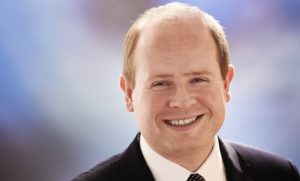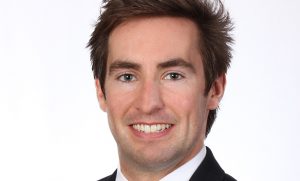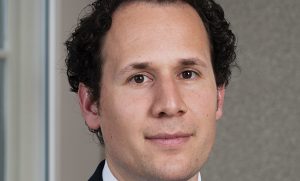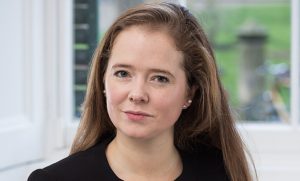'A streetfighter's approach to litigation and a genuine star' - Stars at the Bar 2017 revealed
What sets these junior barristers apart from their peers? QCs, clerks and instructing solicitors explain
August 14, 2017 at 05:24 AM
26 minute read
 Lucy Colter, Andrew Lodder, Angeline Welsh
Lucy Colter, Andrew Lodder, Angeline Welsh
From interviews with roughly 200 solicitors, barristers, QCs and senior clerks, Legal Week has identified 12 highly rated junior commercial barristers to create Stars at the Bar 2017. Here they – and those that rated them -explain what sets them apart.
 Harry Adamson, Blackstone Chambers, call 2013
Harry Adamson, Blackstone Chambers, call 2013
Although relatively junior in call, solicitors say that Harry Adamson "will go far" in his chosen field of commercial disputes. With a strong international profile to his work, ranging from international arbitration to lengthy Commercial Court trials, his leaders have included the co-head of his set, Anthony Peto QC.
That variety of practice in his chosen fields of fraud and commercial litigation means 2017 sees him working on cases involving a European cinema chain; a multinational components company; an internationally-known financial company; and a Caribbean hospitality company, to name but four.
Solicitors love him; he makes their life much easier
What marks him out as "a class act", according to those who instruct him, is his ability – he is "fiendishly clever, commercial and practical", says one lawyer; while one silk describes him as "a bit of a leader's dream – he is very bright, responsive, unflappable and always cheerful".
"Solicitors love him; he makes their life much easier," says one leader, not least because of his hard work. He often works overnight and always to high standards, with one partner noting that "he manages expectations and always delivers when he says he will".
Adamson is aware that the litigation world is changing in the wake of Sir Michael Briggs' 2016 report into modernising civil justice, a report endorsed by both the government and the senior judiciary alike.
He is not against reform; no one, he says, "could object to ensuring that the courts make the most of the opportunities created by advances in technology".
Like the Bar Council though, he has concerns about how an online system will be accessible to those unfamiliar with technology, or whose ability to access justice is constrained, although he acknowledges that "many of those who will struggle with the online system would struggle too with the current one – which is not made easy merely because it operates on paper".
Philip  Ahlquist, Fountain Court Chambers, call 2012
Ahlquist, Fountain Court Chambers, call 2012
"Poise and commerciality" have helped to define Philip Ahlquist's career trajectory so far. With a practice that spans regulatory work, complex civil fraud cases and commercial litigation, he has already attracted the attention of the set's leaders.
Ahlquist has been led by former Bar Council chairman, Tim Dutton QC, in the Djibouti v Boreh litigation, which concerned allegations of misconduct by a former partner at US law firm, Gibson Dunn & Crutcher, while more recently he has been instructed by Herbert Smith Freehills in the mammoth ongoing RBS Rights Litigation, led by David Railton QC of Fountain Court.
His work is marked out by thoroughness, reliability, and diligence according to those instructing him. One partner says Ahlquist is "already more than a safe pair of hands, with particularly accomplished drafting skills".
Cases run best when junior solicitors and barristers can work together
What clients really appreciate is his thoroughness though. Ahlquist "[ensures] that no stone is left unturned in our effort to achieve the best result for our clients", notes one satisfied City lawyer.
Ahlquist himself is flexible in his working habits with solicitors, saying: "I always try to understand the practicalities of what I'm asking solicitors to do." He has built up a strong appreciation of those realties through secondments to corporate counsel and law firms alike.
By appreciating the time and effort spent in e-disclosure, document review exercises and client liaison, "it helps to make cases run smoothly and usually means the whole team gets to where it needs to, sooner".
He is also a fluent intermediary and prides himself on working well with his law firm peers, saying: "Cases run best when junior solicitors and barristers can work together to bridge the gap between judicial and client expectations."
He also has an eye on the future. Noting the recent developments in a variety of class action–style claims in the English courts, he says: "As litigators, we will obviously need to develop methods of case management (both in the legal sense of taking the case to trial, and the commercial sense of managing litigation of this scale) as we get more experience of how these cases develop."
That, he says, poses issues – not just in managing multiple claims from multiple firms – but also for in-house lawyers as well. He notes: "The greater risk of large-scale compensation claims is likely to lead to a more risk-averse approach by large corporate clients."
Mehdi Baiou, One Essex Court, call 2009
With a first-class degree with distinction in mathematics from Imperial College, Mehdi Baiou made an accomplished transition to the law in his professional and vocational qualifications, then building on that meticulous start with an LLM, from University College London, again, gained with distinction.
An interest in commercial law saw him work as a research assistant for competition lawyer, Professor Valentine Korah, and Philip Marsden at the British Institute of International and Comparative Law. So why choose the Bar as a career?
Cool, calm and unflappable
According to Baiou, it was "not so much because of what it would allow me to do every day, but because of who it would give me the opportunity to become".
Baiou says that after a week-long trial during a mini-pupillage with a criminal silk he "knew that one day I wanted to be someone who could do what he'd just done". He adds: "I still feel that way every time I'm led by one of the silks in my chambers."
Some years on, he now works alongside the likes of those "brilliant" One Essex Court silks like Laurence Rabinowitz QC, Anthony de Garr Robinson QC and Craig Orr QC, as well as leaders like Adrian Beltrami QC of 3 Verulam Buildings, and others.
His appearances range from the recent Libyan Investment Authority litigation, to being in the winning team to the first case ever heard in the Financial List – that of Banco Santander Totta v Carris.
Observers say Baiou "is a cool, calm and unflappable person, capable of working with personalities with very strong opinions". He is also "hard-working and capable of meeting very intense timescales, especially in technically challenging matters".
His analytical skills have been in demand in banking and commercial litigation claims, as well as competition law instructions; with one partner describing Baiou as "highly engaging, numerate and able to deal quickly with expert evidence and economic models", adding that he is "fiercely intelligent".
Other instructing solicitors rate him highly – finding him "responsive, user-friendly and astute", while one pointed out he "can distil complex arguments by focusing on the most important points in a compressed timescale, and then argue them in a commercially-focused way".
 Fraser Campbell, Blackstone Chambers, Call 2010
Fraser Campbell, Blackstone Chambers, Call 2010
Fraser Campbell has more insight than some into how City solicitors work – he was once one himself, training and practising at magic circle law firm, Clifford Chance, before transferring to the Bar in 2010.
With a career that has seen him act in hard-fought litigation concerning Blackpool Football Club, with linked unfair prejudice litigation which is ongoing, as well advising the House of Commons Treasury Committee.
A fellow of All Souls, Oxford, Campbell is marked out not just for his academic credentials, but also the incisive way he uses them; one lawyer says "he is a truly exceptional junior", as "his intellect is utterly outstanding". The lawyer continues: "Few can match it; and probably none, exceed it. The quality of his legal analysis is second to none."
His assured practical contributions are no less excellent and his ability to persuade the judiciary is in no small part "due to his ability to present the case in a clear and concise manner, cutting directly to the most important elements". Another instructing solicitor notes that "his work rate is prodigious", adding: "He can get through more material, at speed, yet without sacrificing attention to detail, than any other junior I've come across."
His intellect is utterly outstanding. Few can match it; and probably none, exceed it
Campbell says his background as a commercial litigator helps him "understand the pressures they work under", joking that: "I try to remember that updating the labels on counsel's bundles isn't always the top priority."
To him, "A good barrister should help associates impress partners, and help partners impress clients. This means being realistic when agreeing deadlines – and then never missing them. It's also about finding small ways to be helpful. It can be just as quick to draft a letter as to describe the points to be made."
Likewise, "My favourite solicitors are clear about what they require, and when. They think about what I don't need to see, as well as about what I do. Nothing is more depressing than a forwarded email with 20 random attachments. The big question is the same for solicitors and barristers: is what I'm doing making life easier for the rest of the team?"
Many would say he is already doing just that.
Lucy Colter, 4 New Square, call 2008
Four main strands underpin Lucy Colter's practice: commercial litigation; professional negligence claims; construction and engineering disputes; and insurance law issues. Add in an ongoing interest in international arbitration, and her work as the chair of Young COMBAR, which represents young lawyers at the Commercial Bar Association, and she has all the skills to handle both commercial and construction disputes with ease.
Those that work with Colter describe her as "a brilliant advocate", "one of the most talented barristers I have ever seen", "really skilled – both as a junior being led, and on her own", and "very cool under pressure". She sees off difficult opponents with both dignity and steel according to her peers and attracts judicial praise as she does so.
Her written work has seen her draft "highly complex and difficult pleadings and submissions in technically complex and legally challenging cases, which are outstanding", while managing the cross-examination of multiple construction experts, evidencing her "ability [to] assimilate and use effectively complex factual and technical material". One lawyer says: "some of the cross-examination material she prepared, is amongst the best I have seen. "
There is a serious diversity issue at the junior Bar
Notably, Colter combines this practice with parenthood, with one lawyer pointing out she combines "the competing demands of the bar and motherhood with aplomb".
Colter herself acknowledges the demands she faces, having returned from maternity leave at the end of 2016 to act in a major international arbitration, while also litigating unled, in a separate case.
She says of her experience returning after having her daughter that it was: "highly motivating to be back in court after time away, fighting hard for a result", adding: "It felt like the beginning of a new and very positive phase."
Against this positive experience, she notes: "There is a serious diversity issue at the junior Bar, not just at pupillage level. This is bad in itself and for our reputation as a profession." She says there needs to be more willingness to address the issue, perhaps with external consultation, adding: "The Bar can't rely just on itself to solve this issue."
 Brenna Conroy, Keating Chambers, Call 2010
Brenna Conroy, Keating Chambers, Call 2010
Asked to define the key skills the junior Bar offer clients, Keating Chambers' Brenna Conroy has a ready answer: "intellect, drive and exceptional advocacy skills are taken as a given", she says, but what counts "is being able to provide added value".
Her instructing solicitors would attest to all four of those virtues. They describe her as being "quick-thinking, hardworking and thinking outside the box"; another says she has "a wider understanding of not just the legal perspective, but tactical strategy, demonstrated by her proficiently arguing complicated legal points".
Another solicitor adds: "While she is totally on top of the legal niceties, she is equally able to look at problems from clients' perspectives and propose practical solutions."
There was no plan B
Conroy says her aptitude for constructing persuasive arguments, both in her written work and orally in tutorials, was spotted by her university tutor at Oxford, who suggested she pursue a career at the Bar.
After that, she says, "there was no plan B". Strong performances at the GDL and Bar Vocational Course at BPP Law School led to legal work as a research assistant at Keating, before pupillage and tenancy at Hardwicke Chambers, where she practised from 2012 to 2017 – before rejoining Keating in May 2017.
Her move, she says, was motivated by the will to join a group of "exceptionally talented barristers" [with]a strong collegiate ethos", one in which her preferred areas of work – construction law, property damage claims, international arbitration, and professional negligence – are central to that set's work.
Those instructing her point to her 'can-do' attitude; "enthusiasm about her work" and the fact she "clearly relishes getting stuck in right off the bat".
Conroy though knows that success at the Bar is a matter of experience, not just enthusiasm. She says: "No matter how naturally gifted you might be as an advocate, to master the skill takes experience." To her, "this means taking on as much advocacy work as possible in my own right, no matter how varied the work is".
 Tom Ford, Essex Court Chambers, call 2008
Tom Ford, Essex Court Chambers, call 2008
"He works incredibly hard and always has a smile on his face. The enthusiasm is never dented and he is always a pleasure to have on the team," says one respondent of Tom Ford. Highly commended in 2013's feature, 2017 sees Ford enter this feature in his own right, as someone who is equally as able at major oligarch disputes, as he is in offshore arbitrations and enforcement actions, to mainstream Commercial Court work, be they banking cases, shareholder disputes, or civil fraud claims.
Instructed by firms ranging from Skadden Arps Slate Meagher & Flom, to Clifford Chance, Ford is described by one as a "diligent junior who never ceases to impress with his capacity for hard work", while one leader describes him as "outstanding".
Not afraid to express his views forcefully
What makes him so good? "He has an extraordinary photographic memory combined with a keen eye for the really important matters," notes one senior lawyer, while another says he is "a bold advocate who is not afraid to express his views forcefully, even if it sometimes means having to go toe-to- toe against those who are more senior to him".
During 2016, Ford acted in aspects of the long-running Turkcell litigation, while also advising on complex cross-border insolvency claims in the Hellas Telecommunications liquidation, as well as the successful defence of a $380m freezing order in the High Court for a billionaire oligarch.
Ford himself is acutely conscious of his role in fostering the success of those he assists. To him, the key is "cooperation and teamwork", noting: "The time of barristers keeping to ivory towers is rightly long dead."
Described as one whose youthful appearance "belies a mature needle sharp brain and great intellect along with a litigator's appetite to do the best for his client – and to win", Ford says his main aim is "to be approachable and accessible".
He is also concerned with social responsibility issues, such as pro bono and social mobility, wanting to "help demystify the Bar and support the next generation of talent".
Andrew Lodder  , One Essex Court, call 2012
, One Essex Court, call 2012
Andrew Lodder freely admits that, as a junior barrister, he is fortunate to have experienced the law from two sides, having worked as a solicitor before transferring to the Bar in 2011.
Having been both associate and junior, he has tried to emulate counsel who are "easy to use, responsive and anticipate the next steps, instead of just reacting to instructions", adding that he has "tried to replicate what I liked as a solicitor in my own practice".
That means quick responses and useful information – "even if just to let my solicitors know I have seen the email and when to expect a substantive response."
This willingness to keep everyone on the same page makes him "user-friendly and excellent value for money"; but what mark him out are his legal skills.
Expert at spotting an opponent's weak spot and raining blows on it
A former legal academic at Oxford University, the Australian-qualified lawyer has utilised his Rhodes scholarship to forge not just one career – first at US firm Shearman & Sterling – but two, by transferring to the Bar. He has also worked and qualified as a New York attorney, while his experience with the State Solicitor's Office of Western Australia has given him both public sector and in-house experience.
One partner notes that Lodder has "the magic combination of top-class legal abilities, remarkable diligence, a commercial approach and a charming temperament", adding: "He is a real delight to work with; a team player and genuinely a star."
An expert in unjust enrichment, his work has ranged from the Commercial Court, the Court of Appeal, and international arbitration, marrying "an academic lawyer's grasp of underlying principle, with a streetfighter's approach to litigation – he is expert at spotting an opponent's weak spot and raining blows down on it".
Clients say Lodder "is capable of working long hours, over many days, without any discernible drop in the quality of what he is producing".
Nor is Lodder precious, adds another: "He embraces new technology and is not shy of rolling up his sleeves to sift through documents on our electronic platform, which many members of the Bar would not do."
In short, notes one contact: "Andrew is the complete package, especially when one considers that, added to all the above, he is extremely easy to get along with and a great team player."
 Tom Owen, Keating Chambers, Call 2011
Tom Owen, Keating Chambers, Call 2011
"He has everything you would want of counsel," says one satisfied solicitor of Tom Owen. With a practice background that centres on construction, engineering, infrastructure and projects disputes, but ranges from arbitration, to public international law, professional negligence, and back again to costs law and commercial litigation, Owen certainly has demonstrable versatility and diversity in his growing CV.
With a strong academic background, having graduated first in his BTPC year at Nottingham Law School, Owen has been instructed by the likes of Dentons and DAC Beachcroft, among others, and enjoys strong support from his peers at the construction Bar, having previously been highly commended in this feature for his work last year.
He doesn't back down when challenged
His advocacy skills are a plus point. On being asked to cross-examine a witness, Owen "destroyed the other party's case – such that they withdrew their claim before a decision was reached", notes one witness. Another says: "He doesn't back down when challenged by a judge and continues to fight his corner even in the face of adversity."
Another notes that: "He really gets stuck into the detail, which means he has a full grasp of the facts and always thinks 'outside the box' in terms of the legal arguments and strategy."
Several sources describe Owen as "approachable and easy to work with, which benefits clients". From his perspective, Owen says, succinctly: "Open, clear and effective communication is key," adding that: "It is important to give the utmost attention and commitment to each and every case and client." In demonstrating how to give his best to the firms who instruct him, he is clear what matters to solicitors: "Delivering clear and practical advice is crucial," he says.
As someone who is "personable and has a modern approach to his work", Owen is likewise positive about life at the junior Bar, saying that: "[it] is a great profession to be a part of as a junior. There are plenty of opportunities and reasons to be positive."
 Sandy Phipps, One Essex Court, call 2008
Sandy Phipps, One Essex Court, call 2008
Transitions and trajectories have helped to define Sandy Phipps' career so far. Transitions, in the sense that his career has seen him move smoothly up a career ladder that has swapped Canberra for Oxford, Sydney for London, Freshfields Bruckhaus Deringer for 3 Verulam Buildings, and latterly, 3 Verulam Buildings for One Essex Court in March 2016.
Having qualified as a solicitor in Sydney, before working as a judicial assistant in the New South Wales Commercial List – equivalent to the Commercial Court – and then enjoying a three-year stint at Freshfields Bruckhaus Deringer, Phipps is appreciated for the cumulative benefit of these experiences.
"He ticks all the usual specialist commercial litigation boxes, and his CV speaks for itself," notes one barrister. Another silk adds: "Sandy is outstanding – genuinely first class. It was a massive coup for One Essex Court to get him."
Trajectories, however, also mark Phipps' career – all of them upwards. His character references are stellar. In a fiercely competitive profession, no one has a bad word to say about him; he is "a complete – and total – star, and extremely nice with it".
He gets thing done by combining diplomacy with steel where needed
One partner wisely notes: "He is helped in this respect by the fact that he worked as a solicitor for a few years before the Bar, so he knows what life is like as an associate."
A former colleague notes: "Sandy… [has] acute sensitivity to the often widely varying characters in large litigation teams; he gets thing done by combining diplomacy with steel where needed."
That steel has most recently been seen in a settled case involving the Libyan Investment Authority against Société Générale, in which Phipps acted for the defendant bank team in connection with multibillion-dollar claims brought by a sovereign wealth fund alleging fraud and corruption.
Speak to Phipps and he is clear how closely he likes to work with his law firms: "As closely as possible!" He sees his role as "the main conduit between the counsel and the solicitor teams."
If both sides work together then "ensuring that this relationship is close and functioning well is the key to ensuring the proper allocation of tasks [and the] overall management of the litigation".
 Daniel Piccinin, Brick Court Chambers, call 2010
Daniel Piccinin, Brick Court Chambers, call 2010
If you judge a junior barrister by the company he keeps, then Brick Court has kept Daniel Piccinin in good company.
He has worked with the set's joint head of chambers, Helen Davies QC, and fellow competition lawyers, Daniel Jowell QC as well as other luminaries such as Mark Howard QC, Marie Demetriou QC, and former terrorism watchdog, David Anderson QC, on matters ranging from oligarch disputes to reinsurance to commercial judicial review. Outside of chambers, he has supported superstar silks like Dinah Rose QC of Blackstone Chambers, and Jon Turner QC of Monckton Chambers.
Primarily specialising in competition law, Piccinin is "very considered and authoritative on his feet". As befits someone with a degree in economics, Piccinin's "deep understanding" of that subject, "is invaluable in competition cases; and indeed, his analysis of the economic issues is often better than that of the economics experts in the case".
The speed and precision of his legal analysis is outstanding
He is no less astute legally, given that "the speed and precision of his legal analysis is outstanding", according to instructing partners.
Piccinin himself has racked up appearances in cases as diverse as the challenge by tobacco giant Phillip Morris to the UK plain packaging legislation, to GlaxoSmithKline's challenge to the Competition & Markets Authority's decision on 'pay for delay' cases.
With partners reporting favourably on his contribution to associate teams, Piccinin himself is modest about his achievements.
Piccinin says one challenge he and his fellow juniors face is adjusting to a London practice that must take account of wider global disputes: "Whether it is challenging a newly fashionable regulation, or trying to enforce or resist patents that are used all around the world, the client often needs more than just to present the best possible case to the court in London."
He, and his peers, are ready to rise to this new challenge of "[working] with clients and lawyers around the world to find mutually reinforcing arguments, evidence and tactics to deploy across jurisdictions that can be more than the sum of their parts".
 Angeline Welsh, Matrix Chambers, call 2015
Angeline Welsh, Matrix Chambers, call 2015
Angeline Welsh; remember that name. Her former colleagues at Allen & Overy in London still do; in 2010, Welsh won the International Bar Association's inaugural Pro Bono Award, when just a senior associate. David Morley, the firm's then senior partner, praised her "determination and commitment to achieving fairness and justice", calling it "exemplary".
She did this on top of a day job advising and acting on commercial arbitration, public international law, and investor-state dispute settlement claims.
Then, in 2015, came the switch. She traded 14 years at A&O with a move to the Bar and a new start at Matrix Chambers. Few young barristers would be sitting as an arbitrator, but Welsh is, free from the conflicts that come with magic circle law firms.
Junior barristers are going to have to find a way to compete with law firms
Success on switching was no given. It suits some people and not others, says one barrister, noting that Welsh "has the necessary qualities: great at working independently and forming teams depending on the needs of the case; incredibly hard-working when deadlines all come together; calm under pressure and just gets things done".
One silk adds: "Although she is technically junior in call at the Bar, she comes to it with huge experience from her previous job," while another contact says: "She has built an excellent, independent practice extremely swiftly on arrival, with diverse and cutting-edge cases."
She is, they say, not frightened to tackle novel and difficult areas of law, or "to deal head-on with the more complicated aspects of a case", with "excellent judgment and leadership qualities".
Connections mark her out for having "a vast network of contacts in arbitration throughout the world". On a person level she is, "a really thoughtful, approachable person who takes the time to get to know people, is generous with her time and knowledge and has an excellent sense of humour".
One silk concludes: "In the modern world of the Bar, that's [personal skills] becoming almost as important as having strong technical legal skills."
Welsh herself says that for junior barristers in her field, building an international network is an important challenge.
She explains why: "Law firms, which attract many talented lawyers wanting to specialise in this field, tend to have better connections and resources. Junior barristers are going to have to find a way to compete with that market without the same level of support."
Highly recommended:
Sean Aughey, 11KBW – call 2010 Tom Corby, 20 Essex Street – call 2012 Emma Hargreaves, Serle Court – call 2012 Patrick Hennessey, 39 Essex Chambers – call 2010 Chris Lloyd, Erskine Chambers – call 2011 Harry Wright, 7KBW – call 2012
Methodology
Legal Week contacted up to 200 solicitors, barristers, Queen's Counsel and senior clerks to ascertain their views over an eight-week period, with more than 300 responses, including subsequent follow-up references, nominating recommended junior barristers of 10 years' call and under.
For more, see Stars at the Bar 2017: this year's stars on the judiciary, Brexit and leaving private practice.
- This year's Commercial Litigation & Arbitration Forum, which takes place in London on 2 November, will be co-chaired by Sarah Lee of Slaughter and May and John Reynolds of White & Case. To book your place contact Peter Doolan via email on [email protected] or call +44 (0) 203 868 7555 . For sponsorship enquiries, email [email protected]. Click here for more details about the conference.
This content has been archived. It is available through our partners, LexisNexis® and Bloomberg Law.
To view this content, please continue to their sites.
Not a Lexis Subscriber?
Subscribe Now
Not a Bloomberg Law Subscriber?
Subscribe Now
NOT FOR REPRINT
© 2025 ALM Global, LLC, All Rights Reserved. Request academic re-use from www.copyright.com. All other uses, submit a request to [email protected]. For more information visit Asset & Logo Licensing.
You Might Like
View All

Some Elite Law Firms Are Growing Equity Partner Ranks Faster Than Others
4 minute read
KPMG's Bid To Practice Law in US On Hold As Arizona Court Exercises Caution
Trending Stories
- 1Big Law Firms Sheppard Mullin, Morgan Lewis and Baker Botts Add Partners in Houston
- 2Lack of Jurisdiction Dooms Child Sex Abuse Claim Against Archdiocese of Philadelphia, says NJ Supreme Court
- 3DC Lawsuits Seek to Prevent Mass Firings and Public Naming of FBI Agents
- 4Growth of California Firms Exceeded Expectations, Survey of Managing Partners Says
- 5Blank Rome Adds Life Sciences Trio From Reed Smith
Who Got The Work
J. Brugh Lower of Gibbons has entered an appearance for industrial equipment supplier Devco Corporation in a pending trademark infringement lawsuit. The suit, accusing the defendant of selling knock-off Graco products, was filed Dec. 18 in New Jersey District Court by Rivkin Radler on behalf of Graco Inc. and Graco Minnesota. The case, assigned to U.S. District Judge Zahid N. Quraishi, is 3:24-cv-11294, Graco Inc. et al v. Devco Corporation.
Who Got The Work
Rebecca Maller-Stein and Kent A. Yalowitz of Arnold & Porter Kaye Scholer have entered their appearances for Hanaco Venture Capital and its executives, Lior Prosor and David Frankel, in a pending securities lawsuit. The action, filed on Dec. 24 in New York Southern District Court by Zell, Aron & Co. on behalf of Goldeneye Advisors, accuses the defendants of negligently and fraudulently managing the plaintiff's $1 million investment. The case, assigned to U.S. District Judge Vernon S. Broderick, is 1:24-cv-09918, Goldeneye Advisors, LLC v. Hanaco Venture Capital, Ltd. et al.
Who Got The Work
Attorneys from A&O Shearman has stepped in as defense counsel for Toronto-Dominion Bank and other defendants in a pending securities class action. The suit, filed Dec. 11 in New York Southern District Court by Bleichmar Fonti & Auld, accuses the defendants of concealing the bank's 'pervasive' deficiencies in regards to its compliance with the Bank Secrecy Act and the quality of its anti-money laundering controls. The case, assigned to U.S. District Judge Arun Subramanian, is 1:24-cv-09445, Gonzalez v. The Toronto-Dominion Bank et al.
Who Got The Work
Crown Castle International, a Pennsylvania company providing shared communications infrastructure, has turned to Luke D. Wolf of Gordon Rees Scully Mansukhani to fend off a pending breach-of-contract lawsuit. The court action, filed Nov. 25 in Michigan Eastern District Court by Hooper Hathaway PC on behalf of The Town Residences LLC, accuses Crown Castle of failing to transfer approximately $30,000 in utility payments from T-Mobile in breach of a roof-top lease and assignment agreement. The case, assigned to U.S. District Judge Susan K. Declercq, is 2:24-cv-13131, The Town Residences LLC v. T-Mobile US, Inc. et al.
Who Got The Work
Wilfred P. Coronato and Daniel M. Schwartz of McCarter & English have stepped in as defense counsel to Electrolux Home Products Inc. in a pending product liability lawsuit. The court action, filed Nov. 26 in New York Eastern District Court by Poulos Lopiccolo PC and Nagel Rice LLP on behalf of David Stern, alleges that the defendant's refrigerators’ drawers and shelving repeatedly break and fall apart within months after purchase. The case, assigned to U.S. District Judge Joan M. Azrack, is 2:24-cv-08204, Stern v. Electrolux Home Products, Inc.
Featured Firms
Law Offices of Gary Martin Hays & Associates, P.C.
(470) 294-1674
Law Offices of Mark E. Salomone
(857) 444-6468
Smith & Hassler
(713) 739-1250











